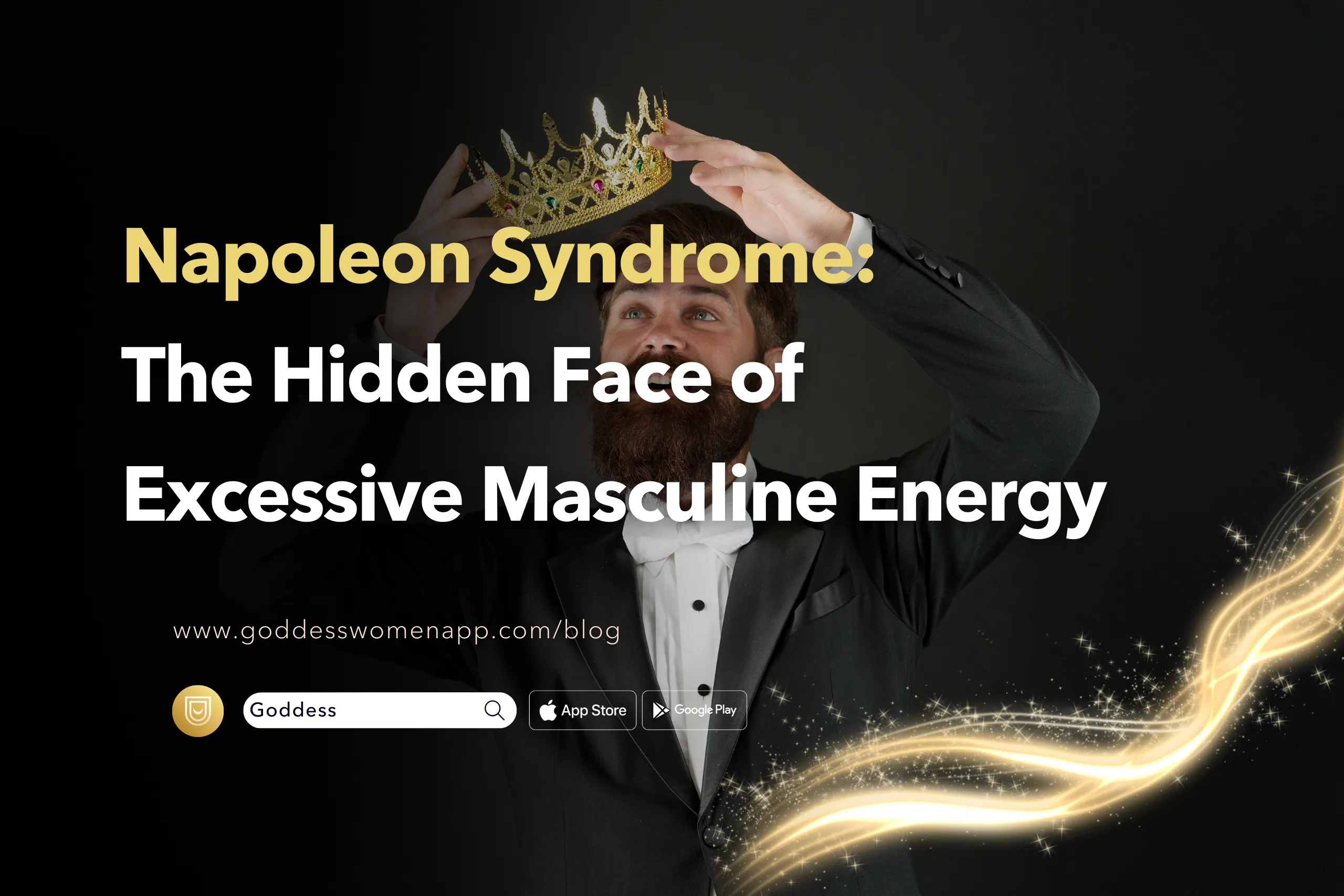Some men grow up with an obsession for power, a desire to control everything, and a constant need to prove themselves. They suppress their emotions, consider empathy a weakness, and try to assert dominance in relationships. This behavior is not only an individual personality pattern; it also reveals another crisis of modern man—the symptoms of excessive masculine energy. This psychological tendency, known as “Napoleon Syndrome,” reflects the mental chaos of modern men, where the pressure to prove themselves, the inability to connect with vulnerability, and the toxic desire for success become concentrated.
In this article, we will explore the psychological dynamics underlying the man in pursuit of power, in the context of excessive masculine energy. This syndrome is not just an individual struggle; it is a collective issue that resonates widely—from men’s relationships with their partners and children to the communities they manage and the systems they create.
Throughout the article, I will reference my book “The New Masculine“ and share ways to balance excessive masculine energy through the Gent mobile app, designed for men’s wellbeing. My goal is to trace not only a strong masculine energy but one that is conscious, healthy, and balanced.
💣 What is Napoleon Syndrome and Why is it So Dangerous?
Napoleon Syndrome is the attempt to mask feelings of physical or psychological inadequacy with excessive self-confidence, a need for control, and repressed complexes. It’s not just a problem for “short men”; it’s a psychological pattern that can subtly take root in anyone, regardless of gender or body type.
At the core of this syndrome lies excessive masculine energy. Masculine energy, by nature, is a force that leads, progresses, and strategizes. However, when out of balance, this energy becomes destructive. It forms the shadow aspect of the Zeus (King) archetype, which I discuss in my book “The New Masculine.”
Think of a mental pattern that puts you in “God mode”: constantly feeling the need to win, refusing to accept mistakes, viewing empathy as a luxury… This is where Napoleon Syndrome begins!
Excessive Masculine Energy and Its Psychological Consequences
For individuals with Napoleon Syndrome, life is mentally coded as a battle that must be won. The mindset of “Either I win, or you lose” permeates all areas of life, from work relationships to romantic connections. This approach creates a constant state of vigilance, where even the slightest challenge is perceived as a threat.
Anger here is not just an emotion; it becomes a defensive weapon. It is often used to dominate others, gain superiority in arguments, or divert attention from weak points. For these individuals, shouting, making sarcastic remarks, belittling, or silencing others become common communication methods.
The expression of repressed emotions often appears in passive-aggressive forms. Coldness, indifference, withdrawing to punish the other person, or subtle sarcasm are refined versions of uncontrolled aggression. Over time, this leads to loneliness, cycles of distrust in relationships, and serious emotional wounds.
For individuals with excessive masculine energy, control is a tool for security. Uncertainty or being under someone else’s control makes them extremely uneasy. Therefore, they only trust their own decisions, which makes it difficult for them to form healthy connections with others. The belief of “I must handle everything myself” gradually turns into manipulative behaviors to dominate all relationships.
These individuals often sabotage others’ decision-making processes, belittle or completely disregard others’ opinions. For them, losing control is seen as weakness, even an existential threat. Their obsession with control extends not only to the outside world but also to their inner world. They are authoritarian even towards their own emotions; crying, showing emotional vulnerability, or being fragile contradicts their inner authority.
However, this constant desire for control comes at a significant cost: extreme stress, burnout, insomnia, and social isolation. Over time, people distance themselves from these individuals because being around them doesn’t allow one to truly “be oneself.” Relationships weaken, and although outwardly their confidence may appear strong, inwardly it begins to decay..
Main Characteristics of Excessive Masculine Energy:
- Dominant (Oppressive)
- Violent tendencies, harsh
- Manipulative
- Excessively competitive/warrior-like
- Rude
- Deep down, fearful
- Selfish
- Emotionless (struggles with empathy)
- Destructive, hurtful
The Road to Narcissistic Personality Disorder

Napoleon Syndrome can gradually evolve into Narcissistic Personality Disorder. This doesn’t happen overnight. While excessive masculine energy associated with Napoleon Syndrome may appear to be characterized by high self-confidence, charisma, and determination, this structure is often built on a fragile ego, serving as a temporary defense system.
When this defensive state becomes permanent over the years, the individual eventually transforms into a personality pattern: Narcissistic Personality Disorder (NPD). However, this transformation doesn’t occur suddenly; it is a slow, insidious process, often internalized to the point where the individual may not even recognize it.
Typical Signs of a Narcissistic Personality
Tendency to Write Victim or Hero Stories:
The person constructs themselves as either the “savior bearing the weight of everything” or the “tragic figure who doesn’t receive the value they deserve.” In both cases, they are at the center of the narrative.
“Self-Centered” Thinking Style:
Everything revolves around the person’s own needs, desires, and achievements. The other person’s story, emotions, or boundaries are secondary. Empathy is almost nonexistent.
Intolerance to Criticism:
Even the slightest feedback is perceived as a threat. Criticism is rejected, belittled, or suppressed with a counterattack because it could damage the “invincible” self that the person has built.
Emotional Insensitivity:
A lack of sensitivity towards others’ pain, fatigue, or boundaries develops. The focus is on the other person’s performance or how “useful” they are, rather than on their needs.
Psychosomatic Symptoms: Mental Issues, Physical Pain

“The body does not lie.” This statement is a powerful truth that expresses how mental pressures will eventually resonate in the body. In cases where excessive masculine energy, like in Napoleon Syndrome, reaches a pathological level, the body becomes the carrier of all the emotional turmoil suppressed by the mind. Obsessions with appearing strong, the need for control, suppressed fears, and anger, if not expressed, are manifested by the body as a kind of “alarm system.”
This is not just a psychological conflict; it is also a psychosomatic chain of problems that directly affect the nervous system, muscular system, digestion, and hormonal balance. Below, we will examine the most common psychosomatic symptoms associated with Napoleon Syndrome in detail:
Possible Physical Conditions:
- Especially lower back pain,
- Digestive system, bowel, and stomach issues.
- Liver problems, and in later years, issues such as prostate problems.
- Usually experiences sleep disturbances.
In Napoleonic Syndrome, the individual disconnects not only from their surroundings but also from their own body. To suppress their emotions, they learn to “ignore” their body. However, the body is not willing to be ignored. Every repressed emotion will eventually leak out: through a migraine, a stomach ache, a sleepless night, or a relationship crisis…
That’s why Napoleon Syndrome psychosomatic symptoms are not just “signs of illness,” but also a cry for help from the inner self.
Awareness and Transformation Tips from Gent
The holistic well-being app for men, Gent, offers practical and in-depth tools for those who want to tackle Napoleon Syndrome and insufficient masculine energy:
Archetypal Transformation Program: Inspired by Carl Jung’s archetype theory, this journey allows you to explore masculine archetypes such as Zeus (King), Ares (Warrior), Apollo (Romantic), and Hephaestus (Magician). Discover the archetype that most influences you. Begin your inner transformation with a personalized 21-day program on the Gent app and bring your unbalanced masculine energy into a healthy balance.
Mindfulness and Meditation Practices: To activate balanced masculine energy, regularly practice the “9 Codes of the New Masculine” meditation series. Chakra balancing meditations, sound bowl sessions, and exercises to heal your inner child will support you on your spiritual deepening journey.
Breathing Exercises: Breathing exercises are a powerful tool for resolving emotional burdens and suppressed traumas stored in the body. These exercises increase your bodily awareness and help the healthy flow of masculine energy.
Podcast Broadcasts: Knowledge is the key to transformation. To reach the truth, one must first recognize false information. With the podcast content prepared by Gent, you will gain information and feel supported during the process of restructuring your masculine energy, knowing that you are not alone.

💬 Conclusion: Moving Beyond Appearing Strong
Napoleon Syndrome is one of the most invisible yet powerful psychological masks of the modern age. From the outside, someone exhibiting this pattern may appear to be a “leader,” “successful,” or “charismatic” figure. They seem to always be in control, defensive against criticism, and constantly chasing success. But often, this appearance is nothing more than a thick armor covering deep inner loneliness, suppressed emotions, and a fear of emotional closeness.
At its core, Napoleon Syndrome is not just a psychological defense mechanism, but also the result of a societal myth of masculinity. Cultural codes that define being a man as “never crying,” “never making mistakes,” and “always being strong” imprison individuals within excessive masculine energy. Over time, this energy becomes toxic—poisoning not only a person’s emotional world but also their relationships with others.
True strength, however, lies in the courage to embrace vulnerability. Being able to say “I don’t know,” “I need help,” or “I’m sorry” doesn’t indicate weakness—it shows maturity. Overcoming Napoleon Syndrome requires more than changing behaviors; it demands recognizing the deep-seated fears, unmet needs, and suppressed emotions at the root.
This inner transformation is not easy. It takes time to dismantle the compulsion to always be strong, which has been built over many years in Napoleon Syndrome. The good news is that this journey is possible and can be supported. Gent, the holistic wellbeing app for men, offers accessible tools for this transformation and plays a crucial role in initiating societal change.
Download Gent now and start your transformation journey with a free 7-day archetype analysis, while also preventing health issues rooted in psychosomatic causes. For deeper understanding of the New Masculine, you can read my new book The New Masculine and support this transformation by recommending it to the men around you, especially who suffers from Napoleon Syndrome.
Besides Napoleon Syndrome, learn more:




